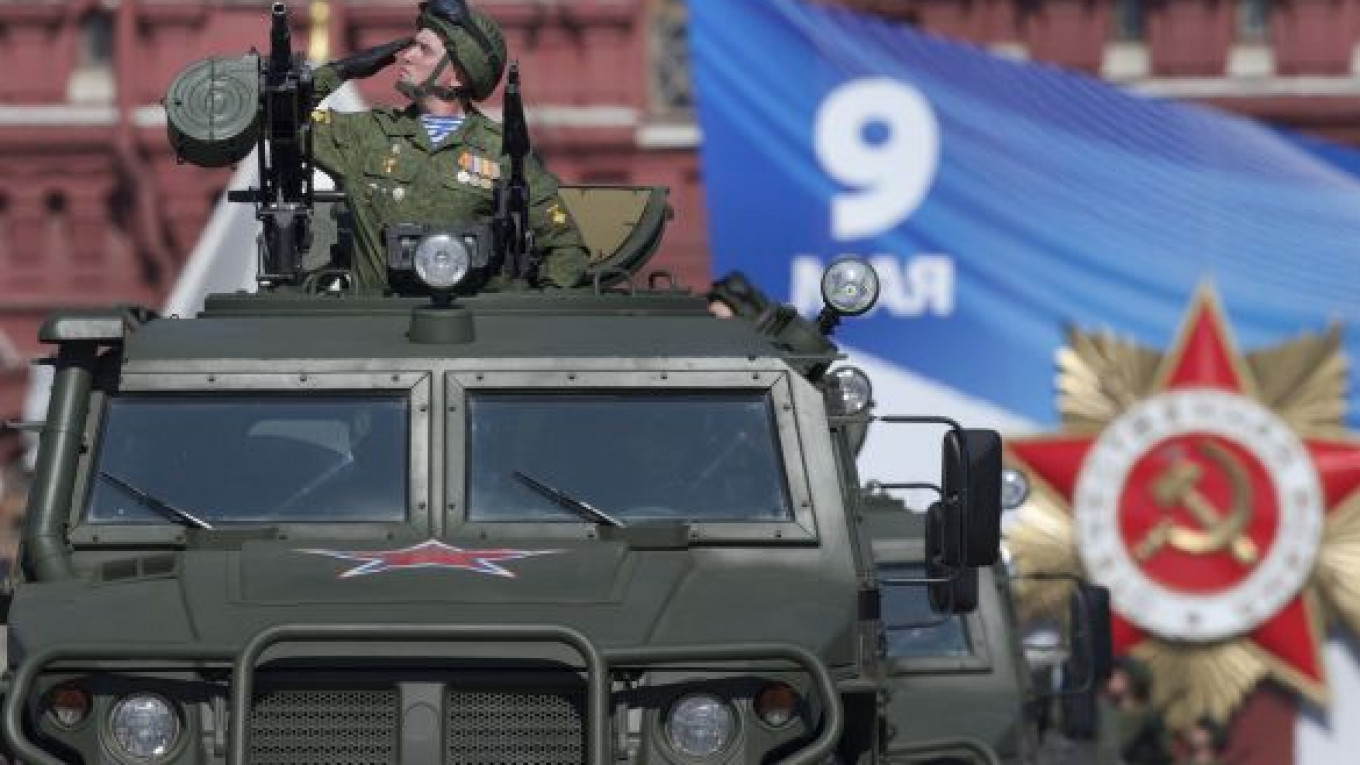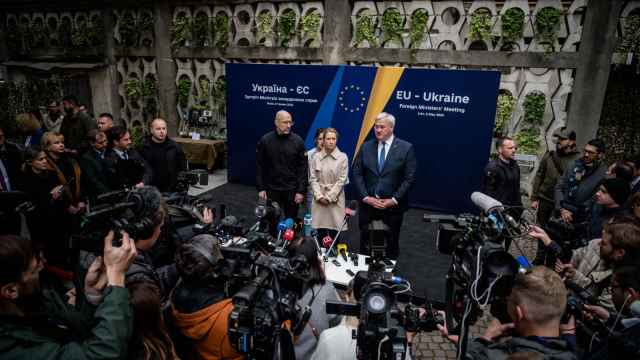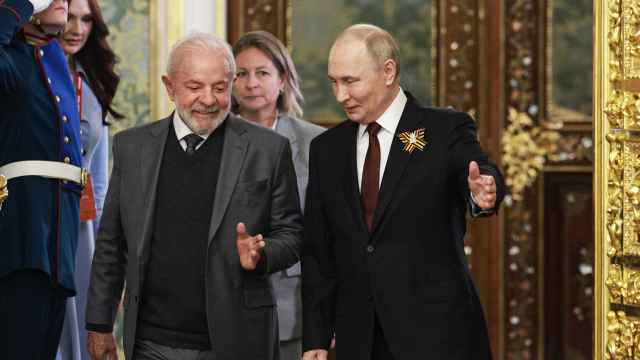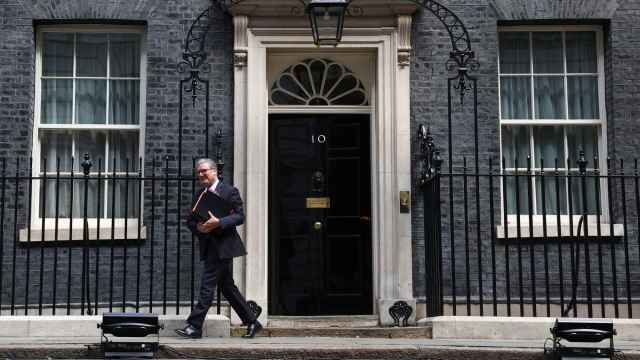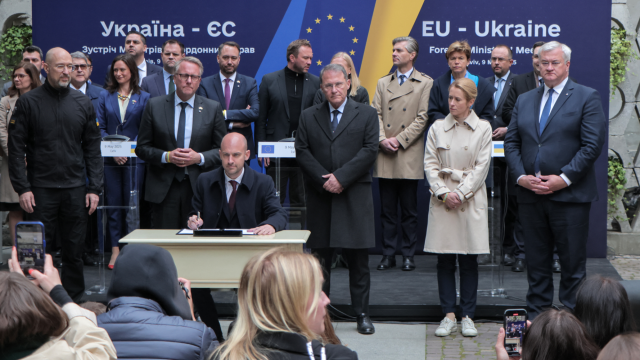Editor's note: This is part of an occasional series on state initiatives to promote patriotism.
The State Duma has ordered an evaluation of a comment made by opposition politician Leonid Gozman in which he compared a Soviet intelligence agency to Adolf Hitler's SS on the grounds that the comment may hurt the image of Russia's military history.
Gozman wrote an op-ed on the Echo Moskvy website last week in which he criticized a TV show about a Soviet security agency that worked during World War II called Death to Spies, or SMERSH in its Russian abbreviation. The show portrayed the officers of the agency, which in Soviet times focused on counterintelligence, as heroes helping the coalition to win the war.
"I'm sure there were honest officers in SMERSH but they were unfortunate to work for an agency that was as criminal as the SS," he wrote. "The word SMERSH must fall into the same category as such words as the SS, NKVD and Gestapo, and cause horror and disgust, but not be a part of the headline for a patriotic movie."
The Duma's sharp reaction to Gozman's words comes amid a drive by President Vladimir Putin to bolster patriotism among Russians, including through the glorification of Russian military exploits. Following Putin's lead, pro-Kremlin politicians have aggressively targeted critical views on certain aspects of Russia's past, and the government plans to create a single set of textbooks for Russian schoolchildren to present a "canonical" version of the country's history.
According to State Duma deputy speaker Ivan Melnikov, from the Communist Party, one of the main reasons behind the Duma's decision to have its Information Policy, Defense and Security committees conduct an analysis of Gozman's comment is because he "holds an important public post within the Rosnano state corporation," in which he is an adviser to the head of the organization.
In comments for The Moscow Times, Gozman called the Duma's initiative "one more amusing instance of buffoonery."
"The first thing I want to say is that along with my comment, the Duma must also check Alexander Solzhenitsyn, Nikolai Astafiyev, Vasily Aksyonov and many other great people, because they said the same thing long before me," Gozman said, adding that the Duma's intention was a sign of the state's policy "to control people's words and thoughts in addition to their actions."
It is not clear what consequences the evaluation of Gozman's comments could have for him.
Communist Melnikov said the lower chamber would issue its proposals and presumably send them to Rosnano, while Gozman said he hoped the Duma's check would turn into a criminal case against him, "because it would be the trial against Stalin, which is long awaited by all."
An outspoken critic of the Soviet era, Gozman said: "Yes, I think Stalin was as much a criminal as Hitler was, and Stalin's punitive agencies were as criminal and disgusting as Hitler's ones."
Nikita Petrov, a historian and member of the Memorial human rights group, said that even though SMERSH had fewer functions than the SS, they both were repressive organizations and instruments used by ruling parties to maintain pressure, meaning it was reasonable to compare the two.
Alexander Khramchikhin, a military expert with the Institute for Political and Military Analysis, on the other hand, said that while the SS was officially recognized as a criminal organization, there were no officially recorded crimes committed by SMERSH. He also noted that SMERSH and the SS were structurally different organizations, and that while the SS had many functions, SMERSH was in charge of only counterintelligence activities.
SMERSH was controlled personally by Stalin, and it was an instrument used to apply pressure not only against militants, Petrov said, but against the civilian population as well. Petrov also echoed Gozman's words that thousands of innocent people fell victim to SMERSH.
In his post on Echo Moskvy, Gozman wrote: "I don't know how many people SMERSH officers shot dead and how many they sent to die in concentration camps. I don't know how many of those shot and arrested were innocent. I believe that very many of them were."
He also said the glorification of SMERSH was understandable given the current political situation, referring to the apparent ongoing crackdown on the opposition and the state's intention to educate patriots.
In light of Gozman's comments, United Russia Deputy Sergei Zheleznyak exhorted the Duma to reconsider a bill that would make criticism of the World War II coalition member states's actions illegal, carrying a punishment of up to three years behind bars. The bill was first passed to the Duma in 2009, but the government banned it at that time.
Zheleznyak told Interfax on Thursday that he filed a request with the Prosecutor General's Office for an analysis of certain bloggers' comments about the recently celebrated Victory Day holiday and parade on Red Square, comments which Zheleznyak considered to be offensive. He said he hoped the agency's evaluation would help bring about "quality amendments to legislation."
Irina Yarovaya, the head of the Duma's Security and Anti-Corruption Committee, said a new project for the bill might be considered by the Duma as early as the spring session.
"I swear, the day this law comes into effect, I will repeat the words I wrote on Echo Moskvy in order to be put under the force of the law," Gozman said.
Historian Petrov said that such a law would be "absurd," and that it likely would not be passed, as it would be "a flagrant violation of constitutional norms and designed to fight dissidence."
In recent years, discussions about Victory Day celebrations have become more and more resonant, with a growing number of people supporting the idea of scaling down the celebrations and making them much less lavish as they are now.
In Soviet times, the Victory Day parade was held only to mark anniversaries of Victory Day, but the parade has been held annually now since 1995.
Since 2008, military equipment has been used in the parade to demonstrate Russia's military glory and prowess. In the 2000s, the government introduced various additional street activities to the parade, making Victory Day one of the biggest and loudest ways to bring the nation together.
"This is a grievous day, and such a pompous way to celebrate it is disrespectful to those who were killed in the war," Petrov said. "When the celebration becomes so pompous, people's reaction to these pseudo-patriotic lies is inevitable; this reaction is based on people's feelings, not on a desire to insult anyone."
Contact the author at e.kravtsova@imedia.ru
A Message from The Moscow Times:
Dear readers,
We are facing unprecedented challenges. Russia's Prosecutor General's Office has designated The Moscow Times as an "undesirable" organization, criminalizing our work and putting our staff at risk of prosecution. This follows our earlier unjust labeling as a "foreign agent."
These actions are direct attempts to silence independent journalism in Russia. The authorities claim our work "discredits the decisions of the Russian leadership." We see things differently: we strive to provide accurate, unbiased reporting on Russia.
We, the journalists of The Moscow Times, refuse to be silenced. But to continue our work, we need your help.
Your support, no matter how small, makes a world of difference. If you can, please support us monthly starting from just $2. It's quick to set up, and every contribution makes a significant impact.
By supporting The Moscow Times, you're defending open, independent journalism in the face of repression. Thank you for standing with us.
Remind me later.


